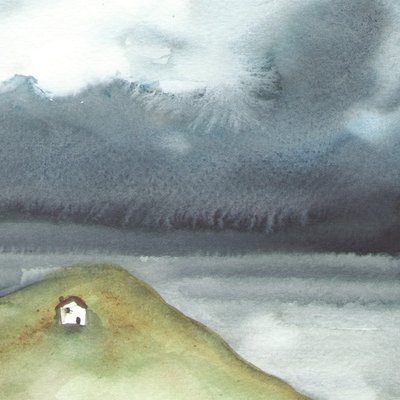Okay so I waited and waited for someone to take a wild guess on the poet but no one did (it's okay, I don't take heart), so here goes;
One poet praised on how generous he is in giving charity, but his wife said to him, 'ya habibi, we're bankrupt, we don't have money, we don't have food, what are you talking about?' He turned to his wife and replied in poetry,
"Fasailu harbun 'ala makanin 'ali" (translated: Heavy rains doesn't get along with a house on top of a hill)
'Heavy rains doesn't get along with a house on top of a hill', what's that have to do with being charitable? Okay, picture a house on top of a hill, and its raining. Provisions, ni'mat, they all comes from the sky. Does the water stays on top of the hill or it runs down to the foot of the hill? Of course the water runs down to the foot of the hill, and fed the people who lives there.
In this world, there are two categories of people, the lowly people, and the highly people. The highly people which is closer to the sky (closer to God), and those lowly people were the worldly people. The provisions don't stay with the people on top of the hills, because the water runs down to the worldly people, and it stays there in the forms of river, lakes, etc.
So the richer people are actually lowly, whilst the poet, is highly people, because he kept giving charity until there're no money left of him. He meant all of these by just saying 'heavy rains doesn't get along with a house on top of a hill'.
That's how beautiful their spoken words, poems, riddles were (mind you, these are spoken, not something you thought long and hard, then come out with such beautiful stuffs). Nouman Ali Khan (NAK) said that this happens for a reason. A reason that Allah made as a setup for his final Messenger to deliver His Words.
Arabs, or ancient arabs I should say, long before they discover oil, they were hanging out in the desert, what do you have in the desert, if I may ask? Nothing kan? So at times of Rasulullah, there are two superpowers in the world, that is the Persian Empire and the Roman Empire, and the nature of an empire is that it will always try to expand its power, its influence, and wars after wars happened between these two empires but they 'tak hingin sikit pun' to disturb the Quraisy people.
Therefore, this long seclusion, happens to lead to the development of their language. The ancient Arabs have high imagination because they do not see anything other than sands, sky, stars, and camels. A good imagination is one that don't bersangkut paut with the things that around you, if not, you can say, 'alah, bosan la cerita kau, lapuk la.' But the ancient Arabs do have good imaginations, that's why they could come up with such idioms. and do you know that they could describe rain in 1000 words, another 1000 for camel, etc2.
As explained in Part 1, they were critical about it and took their language seriously and this is never child play. Any nation or states will always have something to be proud of (pride of the nation e.g. Malaysians have the best food in the world, China have the most population in the world etc2) so, the Quraisy were very proud in their language.
So arab language hit its peak at times of Jahiliyyah, only 100 years later, after globalisation, the language has differ a lot. Ye lah kan, if you are a Kelantanese, and you've been exposed to KL for long time, sometimes you can lose your slang. A Kelantanese who lives 50 years in KL, compared to a Kelantanese who lived all his life in Pasir Mas or Jeli (ceruk2 tu), of course his language/words/slang might have lost. Same thing happens with the Arabic language, it loses the essence and the richness so much so that an Arab cannot understand spoken words riddles idioms of ancient Arabs, unless they study the Quraisy's Arabic thoroughly.
That explains why the Arabs, although the Quran is in arabic, they still cannot understand it properly, because if they do, they would have bowed down when they heard the ayat of sajdah (like the Quraisy do - happened in some narrations). Even the leaders who are egomaniac, can't help but to cry in front of their people because the words touches the heart.
Fuh, panjang. So, what I'm trying to say is, as the language hits its peak, Rasulullah comes and spoke words that buat diorang terkedu bisu seribu bahasa, words that they cannot reply to, things they cannot dealt with, that they cannot argue with.
Nak contoh?
Tunggu part 3. Heheh. (Tulis panjang2 nanti bosan pulak kan?)
Anyway, one more quiz, in surah al-Hajj, ayat 31, Allah said;
وَمَن يُشْرِكْ بِاللَّهِ فَكَأَنَّمَا خَرَّ مِنَ السَّمَاءِ فَتَخْطَفُهُ الطَّيْرُ أَوْ تَهْوِي بِهِ الرِّيحُ فِي مَكَانٍ سَحِيقٍ
Barangsiapa mempersekutukan sesuatu dengan Allah, maka adalah ia seolah-olah jatuh dari langit lalu disambar oleh burung, atau diterbangkan angin ke tempat yang jauh.
What do you think Allah meant by these 3 things? (These are the ancient Arabs sayings originally)
What's mempersekutukan Allah have to do with jatuh dari langit lalu disambar burung and terbang ke tempat jauh?
Selamat Berramadhan :)


No comments:
Post a Comment